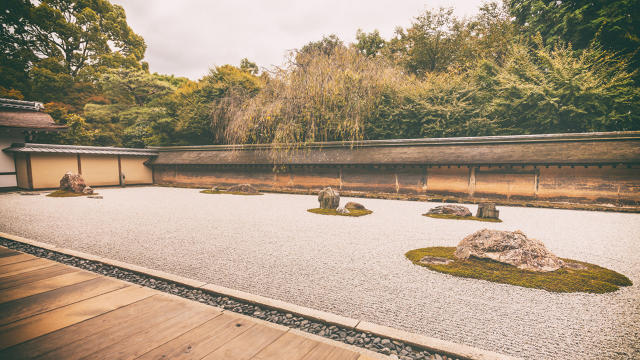Jcbaran

Posts : 1620
Join date : 2010-11-13
Age : 74
Location : New York, NY
 |  Subject: from Fast Company - Here's How a Month of Zen Meditation Changed My Live Subject: from Fast Company - Here's How a Month of Zen Meditation Changed My Live  6/6/2016, 11:20 am 6/6/2016, 11:20 am | |
| Here's How a Month of Zen Meditation Changed My Life:The Buddhist meditation practice is over 1,500 years old, but modern science says it has very real mental and physical health benefits.MICHAEL GROTHAUS 06.02.16On a trip to Japan last year, one of the places I visited was Kyoto, home to over 2,000 Buddhist temples and Shinto shrines. During one of my daily walks exploring the city and its forested borders, I came across the Ryōan-ji temple, one of the most beautiful Buddhist temples in the world. As you would expect, the temple grounds were full of tourists and locals enjoying the cool May breeze. There were also a handful of Buddhist monks actively engaged in Zen meditation. While meditating, these robed monks seemed impervious to any distraction, a huge feat considering the number of people on the grounds that day. Impressive, yes, but no doubt a mastery gained because, well, what else are monks going to do all day?
But then as I continued roaming the temple grounds, I came across a Japanese woman decked out in a clearly expensive business suit sitting cross-legged on the ground, with her heels and purse placed at her side. She too was meditating exactly as the monks were—eyes closed, effortless breathing, seemingly impervious to the noise of the people around her. I watched her for 10 minutes, and she didn’t open her eyes once, nor move much at all. Then finally she opened her eyes, smiled at me, and got up, where a smartly dressed assistant who I hadn’t noticed before bowed and then led her to a black luxury car where a driver was likely waiting to take her off to some business meeting. 
It’s natural to assume that meditation automatically brings inner peace, but at the start of my journey, trying to be Zen just made me cranky for a number of reasons. First, it was hard for me to shut off all my devices during meditation sessions—I was afraid I was going to miss an important message during my 30-minute meditation each evening. But I wanted to get this right, so I switched off every distraction I could think of. Next, I brought out the exercise mat, lit candles, dimmed the lights, and even sat zazen.The more I forcefully tried to let go of my thoughts, the more they popped into my head.While this set the stage for Zen meditation, when I actually closed my eyes and concentrated on my breath it was hard for me to let go of any of the thoughts I had in my head. That’s a problem, considering letting go of your thoughts is one of the main goals of Zen meditation. The more I forcefully tried to let go of my thoughts, the more they popped into my head. My mind just kept wandering from one thing to another, and I began to think I just wasn’t the kind of person who could meditate. Because of this, and rather ironically, my first attempts at Zen meditation made me more stressed and anxious than I usually am.Yet this increased anxiety and doubts about my ability to "be Zen" is normal for beginners, according to Dan Tricarico, a high school English teacher and author of [url=https://www.amazon.com/Zen-Teacher-Simplicity-Tranquility-Classroom-ebook/dp/B016989HGY?ie=UTF8&keywords=the zen]The Zen Teacher: Creating Focus, Simplicity, and Tranquility in the Classroom[/url]. "The irony of Zen, meditation, and mindfulness is Western society’s obsession with ‘getting it right,’ when the entire point of mindfulness, Zen, and meditation is that the duality of ‘right’ and ‘wrong’ is illusory, and that things just ‘are’," says Tricarico.He points out that one of the biggest misconceptions about Zen meditation is that the meditator isn’t allowed to have thoughts in their head. "But that’s not true," says Tricarico. "We can’t stop our thoughts. Zen meditation simply helps us notice the thoughts without attaching to them or judging them. The metaphor I heard that helped me understand this was from someone who said, ‘You can sit at the side of the stream and watch the water go by, but that doesn’t mean you have to jump in and be up to your elbows in it.’ The same is true with our thoughts. We can’t stop them from flowing, but we can sit on the riverbank and just watch them float by."And Tricarico was right. Because by the end of the first week, I had stopped trying to stomp my thoughts out and instead just let them flow around freely as I concentrated on my breathing. The first time I noticed I had done this successfully was when I looked at the clock thinking only five minutes had passed. In actuality, 25 minutes had gone by.Phase Two: I Slept Better And Woke More Refreshed And Focused
The first week I felt sleepy after meditating. But by week two I actually felt more alert afterwards. By week three I swear this alertness carried over into my work life. I felt more focused much of the day and was better able to concentrate on tasks without outside stimulus. That’s right: I actually drank fewer cups of coffee. I just didn’t need the caffeine hit like I normally do.I actually drank fewer cups of coffee. I just didn’t need the caffeine hit like I normally do.Also by week three I also noticed I was getting to sleep faster than I normally do. At first I thought this was due to meditating right before bed, but the following week I meditated in the afternoons and I still managed to fall to sleep faster than I normally do. Also, I woke up in the morning more easily, and feeling more refreshed.Tricarico says the sleepiness when you first start meditating is normal. After all, our bodies are programmed to recognize that quiet time with our eyes closed usually means we want to go to bed. "When I was a drama teacher, many of my students fell asleep when we started doing guided visualizations and meditations, simply because the exercises are so relaxing," Tricarico says, but with practice, the relaxation you feel from Zen meditation stays around without you nodding off—until you actually want to, that is."One of the obvious benefits of meditation is relaxation. And I’m sure science would agree that the more relaxed you are, the easier it is to fall asleep. I think your body understands that you have made an attempt to lower your rhythm and decrease your stress and so better (and easier) sleep may be your body’s way of rewarding you," he notes.Phase Three: I Felt Less Rushed And More Confident
Another benefit I noticed in week three and week four was that I felt less rushed than I normally do. I had just as much to do each day, of course, but I felt less anxiety about the time I needed, and my ability to accomplish all the tasks I needed to get done. It’s as if I had more confidence."Knowing that whatever gets done gets done is an amazing feeling. It’s like having a secret that no one else has.""For me, this is one of meditation’s greatest benefits," says Tricarico. "There is something liberating, almost subversive, about knowing that you have the same amount of stuff to do each day, but that you’re not anxious about it and not feeling rushed. Knowing that you’re in the moment and that whatever gets done gets done and that that’s okay is an amazing feeling. It doesn’t always happen, but when it does, it’s like having a secret that no one else has."Phase Four: My Mood And Patience Improved
Contrary to my increased crankiness when I first started Zen meditation, by the last week I noticed I was decidedly less moody and more patient than I was even before I started meditating four weeks earlier. I’m generally one of those guys who gives you the death stare if you can’t figure out where the change in your purse is to pay for your coffee as I wait in line behind you with somewhere more important to be. But by week four I’d happily wait patiently as the barista remade your venti caffe mocha with the right kind of sprinkles.Annoyances, of course, come from personal expectations of a desired outcome that doesn’t arise. Zen meditation, says Tricarico, offers you a sense of detachment from expectations, which can result in lighter moods. "That sense of detachment from expectation and what I call ‘intentional and radical self-compassion’ (simply being kind to yourself) is also one of the benefits of meditation and can be quite satisfying," he says.HOW TO WORK MEDITATION INTO YOUR DAILY LIFEAfter my four-week journey through Zen meditation, I’m a believer in its benefits. It’s not a miracle cure-all, but it definitely helped me become more focused, get better sleep, and improved my mood. And though I dedicated 30 minutes a day to meditation zazen style—just like the business woman in Kyoto—Tricarico says there’s no right or wrong way to "do Zen.""Another misconception is that if you want to meditate you have to shave your head, wear a robe, move to a monastery, and be a monk on top of a mountain in China or India," he says. "Not so. Anyone can meditate, regardless of his or her lifestyle or background. It can be as long or as short, as formal or as informal, as you want.""The busier we are, the more we can benefit from stillness and mindfulness. But it doesn’t have to take forever."Tricarico notes that the environment you’re in or position you choose is less important than people realize. You can do Zen meditation sitting, standing, or laying in bed; at the office or in the car or at a dedicated Zen meditation center. "One of my most ‘formal’ meditation sessions is a walking meditation I do every morning at 5 a.m. where I listen to the birds, look at the moon, and enjoy the stillness while I focus on my breathing and each step I take. It’s heaven," he says.As for the time you need each day, you needn't do my 30-minute sessions."There’s an old saying: ‘If you’re busy, meditate for 30 minutes. If you’re REALLY busy, meditate for an hour’," Tricarico says. "The moral there, I think, is that the busier we are, the more we can benefit from stillness and mindfulness. But it doesn’t have to take forever.""There’s a chapter in my book where I talk about no matter how busy you are, you can carve out five minutes. Start there. Take some slow breaths and listen to the birds, look at the sky, listen to a Beatles’ song. That’s meditative, too," he notes. "Starting with five minutes a day is absolutely acceptable and probably a good place to start. Even if you sit zazen for an hour twice a day, a quick five-minute breathing session can always help." | |
|
